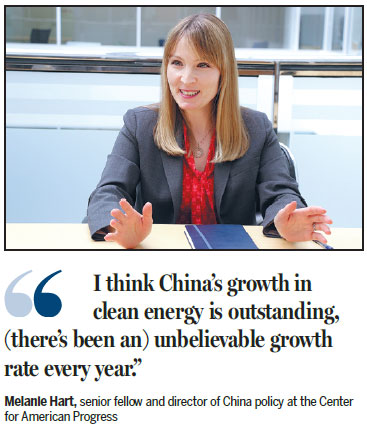
US think tank representative says she looks to Beijing for 'safety net' amid White House's indifference
Melanie Hart, senior fellow and director of China policy at the Center for American Progress think tank, has spent much of the past year studying how to sustain and broaden China-US collaboration on climate change.
She wants to find out what signal China will send out on the climate front in the upcoming two sessions, given US President Donald Trump's lack of enthusiasm in this area.
The two sessions are the annual gatherings of the National People's Congress, the highest organ of state power, and the Chinese People's Political Consultative Conference, the nation's top political advisory body.

Hart said observers will be looking for answers to two questions from the gatherings: "How much of China's role as a global leader depends on the US and China standing side by side?" and "If the US becomes more quiet, or less engaged, (on the climate front) what will China's actions be?"
She said she will keep pushing the US government on the issue.
"We look at the Chinese leaders as a kind of safety net," she said.
From her conversations with her Chinese counterparts, Hart has found that the country is still very determined to combat climate change despite a slowing economy. She believes China will have no problem hitting its emission reduction targets for 2030.
China has the capacity to be a global leader in climate change, she said. In her view, the nation's role is critical, because it is a developing country and much of the growth in global emissions emanates from developing countries.
Hart pointed out that China has already taken a step forward in the field of economic development with the launch of the Asian Infrastructure Investment Bank. The nation is helping to build infrastructure that developing countries need, and can pair that with climate leadership by ensuring projects are built sustainably
"I think it is a natural pairing," she said.
Hart, who speaks fluent Chinese, went on a clean energy fact-finding mission around China in December. "I think China's growth in clean energy is outstanding, (there's been an) unbelievable growth rate every year," she said.
But she also found that the best clean technologies still struggle to gain market share and access to the grid because of coal's dominance.
During her trip, Hart visited some of the "cleanest coal plants in the world", she said, yet they were only running at 50 percent capacity.
"So, I am watching to see when Chinese leaders start to shift more support toward those amazing new technologies, so the cleanest plants in China can run at 100 percent," she said.
Hart noted that the Trump administration might moderate its attitude on climate change in the future, but she believes that in the years ahead, any action the US takes on the climate front will be mainly at the state, rather than federal, level.
Related Stories
